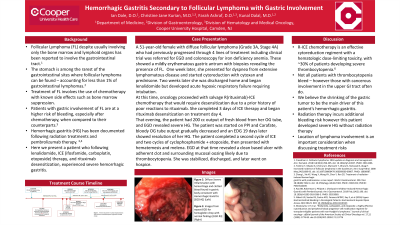Sunday Poster Session
Category: GI Bleeding
P0622 - Hemorrhagic Gastritis Secondary to Follicular Lymphoma With Gastric Involvement
Sunday, October 22, 2023
3:30 PM - 7:00 PM PT
Location: Exhibit Hall

Has Audio

Ian W. Dale, DO
Cooper University Hospital
Camden, NJ
Presenting Author(s)
Ian W. Dale, DO, Christine J. Kurian, MD, Farah Ashraf, DO, Kunal Dalal, MD
Cooper University Hospital, Camden, NJ
Introduction: Follicular Lymphoma (FL), while usually involving only bone marrow and lymphoid organs has been reported to involve the gastrointestinal tract. In the stomach FL accounts for less than 1% of gastric lymphomas. Treatment can lead to thrombocytopenia from bone marrow suppression and patients with gastric involvement have this extra source of GI bleeding, especially after chemotherapy, to consider. There are known cases of hemorrhagic gastritis (HG) induced by radiation treatment and pembrolizumab. However, this is the first reported case of severe HG following lenalidomide, R (rituximab)-ICE (ifosfamide, carboplatin, etoposide) chemotherapy for FL.
Case Description/Methods: A 51-year-old female with diffuse FL (Grade 3A, Stage 4A) who had previously progressed through 4 lines of treatment, including clinical trial, was referred for EGD and colonoscopy for iron deficiency anemia. These showed a mildly erythematous gastric antrum with biopsies revealing the presence of FL. One week later, she presented for dyspnea from extensive lymphomatous disease and started cytoreduction with cytoxan and prednisone. She was later discharged home and began lenalidomide but developed acute hypoxic respiratory failure requiring intubation.
At this time, oncology proceeded with salvage R-ICE therapy that would require desensitization due to a prior history of poor reactions to rituximab. She completed 3 days of ICE therapy and began rituximab desensitization on treatment day 4.
That evening, the patient had fresh bloody output from her OG tube, and EGD revealed severe HG. The patient was started on PPI and carafate. Her bloody OG tube output gradually decreased and an EDG 19 days later showed resolution of her HG. She completed additional cycles of ICE and cyclophosphamide + etoposide which was further complicated by a gastric ulcer with mucosal oozing. She was stabilized, discharged, and later went on hospice.
Discussion: Catastrophic bleeding in the lymphoma patient is multifactorial in nature. Thrombocytopenia from bone marrow suppression is a known treatment side effect. Cancerous involvement in the upper GI tract confers a higher risk of bleeding with thrombocytopenia. In this patient we believe the shrinking of the gastric tumor to be a main driver of her HG. This case highlights that location of involvement of lymphoma is important when considering treatment risks and that chemotherapy, even without radiation, still incurs the risk of HG.

Disclosures:
Ian W. Dale, DO, Christine J. Kurian, MD, Farah Ashraf, DO, Kunal Dalal, MD. P0622 - Hemorrhagic Gastritis Secondary to Follicular Lymphoma With Gastric Involvement, ACG 2023 Annual Scientific Meeting Abstracts. Vancouver, BC, Canada: American College of Gastroenterology.
Cooper University Hospital, Camden, NJ
Introduction: Follicular Lymphoma (FL), while usually involving only bone marrow and lymphoid organs has been reported to involve the gastrointestinal tract. In the stomach FL accounts for less than 1% of gastric lymphomas. Treatment can lead to thrombocytopenia from bone marrow suppression and patients with gastric involvement have this extra source of GI bleeding, especially after chemotherapy, to consider. There are known cases of hemorrhagic gastritis (HG) induced by radiation treatment and pembrolizumab. However, this is the first reported case of severe HG following lenalidomide, R (rituximab)-ICE (ifosfamide, carboplatin, etoposide) chemotherapy for FL.
Case Description/Methods: A 51-year-old female with diffuse FL (Grade 3A, Stage 4A) who had previously progressed through 4 lines of treatment, including clinical trial, was referred for EGD and colonoscopy for iron deficiency anemia. These showed a mildly erythematous gastric antrum with biopsies revealing the presence of FL. One week later, she presented for dyspnea from extensive lymphomatous disease and started cytoreduction with cytoxan and prednisone. She was later discharged home and began lenalidomide but developed acute hypoxic respiratory failure requiring intubation.
At this time, oncology proceeded with salvage R-ICE therapy that would require desensitization due to a prior history of poor reactions to rituximab. She completed 3 days of ICE therapy and began rituximab desensitization on treatment day 4.
That evening, the patient had fresh bloody output from her OG tube, and EGD revealed severe HG. The patient was started on PPI and carafate. Her bloody OG tube output gradually decreased and an EDG 19 days later showed resolution of her HG. She completed additional cycles of ICE and cyclophosphamide + etoposide which was further complicated by a gastric ulcer with mucosal oozing. She was stabilized, discharged, and later went on hospice.
Discussion: Catastrophic bleeding in the lymphoma patient is multifactorial in nature. Thrombocytopenia from bone marrow suppression is a known treatment side effect. Cancerous involvement in the upper GI tract confers a higher risk of bleeding with thrombocytopenia. In this patient we believe the shrinking of the gastric tumor to be a main driver of her HG. This case highlights that location of involvement of lymphoma is important when considering treatment risks and that chemotherapy, even without radiation, still incurs the risk of HG.

Figure: Diffuse severe inflammation with hemorrhage and clotted blood found in the gastric antrum consistent with hemorrhagic gastritis
Disclosures:
Ian Dale indicated no relevant financial relationships.
Christine Kurian indicated no relevant financial relationships.
Farah Ashraf indicated no relevant financial relationships.
Kunal Dalal indicated no relevant financial relationships.
Ian W. Dale, DO, Christine J. Kurian, MD, Farah Ashraf, DO, Kunal Dalal, MD. P0622 - Hemorrhagic Gastritis Secondary to Follicular Lymphoma With Gastric Involvement, ACG 2023 Annual Scientific Meeting Abstracts. Vancouver, BC, Canada: American College of Gastroenterology.
